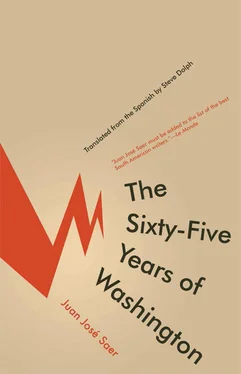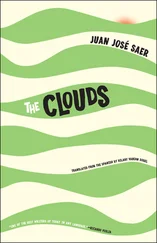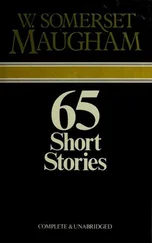Juan José Saer - The Sixty-Five Years of Washington
Здесь есть возможность читать онлайн «Juan José Saer - The Sixty-Five Years of Washington» весь текст электронной книги совершенно бесплатно (целиком полную версию без сокращений). В некоторых случаях можно слушать аудио, скачать через торрент в формате fb2 и присутствует краткое содержание. Год выпуска: 2010, Издательство: Open Letter, Жанр: Современная проза, на английском языке. Описание произведения, (предисловие) а так же отзывы посетителей доступны на портале библиотеки ЛибКат.
- Название:The Sixty-Five Years of Washington
- Автор:
- Издательство:Open Letter
- Жанр:
- Год:2010
- ISBN:нет данных
- Рейтинг книги:3 / 5. Голосов: 1
-
Избранное:Добавить в избранное
- Отзывы:
-
Ваша оценка:
- 60
- 1
- 2
- 3
- 4
- 5
The Sixty-Five Years of Washington: краткое содержание, описание и аннотация
Предлагаем к чтению аннотацию, описание, краткое содержание или предисловие (зависит от того, что написал сам автор книги «The Sixty-Five Years of Washington»). Если вы не нашли необходимую информацию о книге — напишите в комментариях, мы постараемся отыскать её.
The Sixty-Five Years of Washington — читать онлайн бесплатно полную книгу (весь текст) целиком
Ниже представлен текст книги, разбитый по страницам. Система сохранения места последней прочитанной страницы, позволяет с удобством читать онлайн бесплатно книгу «The Sixty-Five Years of Washington», без необходимости каждый раз заново искать на чём Вы остановились. Поставьте закладку, и сможете в любой момент перейти на страницу, на которой закончили чтение.
Интервал:
Закладка:
— Tomatis being a typical example, says Leto.
— Exactly, says the Mathematician. They laugh. According to Botón, Tomatis, when the discussion over the stumbled horse had picked up, had said about Noca: If a horse walks into a bar and stumbles, it’s the horse’s fault; if it’s walking out, it’s Noca’s fault . Everyone laughed, according to Botón, but in reality they didn’t know. In reality , says the Mathematician, Noca’s horse, and even Noca’s story, are irrelevant to the argument. You only need to generalize the problem: Do horses stumble or not? And then, as Barco says, what do you mean by stumble?
Just back from Europe, the previous Saturday, the Mathematician had boarded the ferry to see a rugby match in Paraná. Leaning on the railing of the upper deck, with his lit pipe clenched tightly between his teeth, watching the big tractor trailers lining up in rows on the lower deck, he sees Botón board at a run, holding a bag in one hand and his guitar case in the other and, judging by the speed and precision with which he climbs the stairs and walks up next to him, without lifting his eyes once, thinks Botón must have seen him from the dock, before getting on the ferry — Botón who, as the Mathematician guessed at seeing him sidestep, clean and freshly combed and shaved, the trucks maneuvering, noisily and almost at a crawl, to board and line up on the ferry — Botón, who the Mathematician, I was saying, no? has guessed his plans to spend the weekend with his family in Entre Ríos, and who, as soon as they sat down on a wooden bench on the upper deck, at the stern, began telling him, in complete detail, about the birthday party. They’ve taken the midday ferry for different reasons, the Mathematician because he figures that since the trip takes two hours and the match starts at 3:30, he will have time to walk to the field, and Botón because, as he put it, he should have taken the ten o’clock, since the bus to Diamante leaves at 2:30, but he overslept and now he’ll barely have time to get from the docks to the station and jump on the bus. It’s cloudy but not cold: both reasons they can stay on deck at midday. Blinded by repetition, they don’t see the gradual withdrawal, as the ferry moves away, of the suspension bridge on the southern side, the regatta club, the harbor, Alto Verde on the opposite shore, the inlets, the islands, the canoes and motorboats that, in the opposite direction, are navigating toward the city. The overcast sky is unique: the clouds are small, almost square, stuck to together at the ends, which are a darker gray than at the slightly protuberant centers of each; motionless, they cover the whole sky, to the horizon, almost all the same size, so that the firmament, whose name was never better suited, though the name applies to the starlit sky and not, specifically, to the clouds, gives the impression of being a concave, stone-walled vault. That rocky, stable sky would last all day, until at nightfall, without a sound, it would begin to dissolve, not before passing through a much darker gray, a smooth phase, with an ever-increasing rainfall that would last until the evening the following day. But at midday on Saturday, above the ferry, the river, and the islands, it still conserved that hardness of pavement. Botón, who has left the bag and the guitar on the bench they’re sitting on, takes a bar of chocolate from his pocket and undressing it — why not — halfway down its two layers of printed and silvery paper, extends it to the Mathematician who, with distant and pensive courtesy, refuses it. Without formalities, Botón asks, point blank, the inevitable question: How was your trip? And the Mathematician, a few seconds later, with his gaze fixed on the point where the ferry’s wake begins to disappear on the surface of the river, hears himself repeat for Botón, not without a certain distaste, the list of cities that bring with them the supposedly empirical images that, ever since his travels, accompany their names: Venice, the real gateway to the East and not Istanbul; Warsaw, there was nothing left; Bruges, they painted what they saw; Madrid, the thing you feel you’ve lost abroad you rediscover there. Botón observes him a few seconds, without blinking, his head slightly tilted, already thinking about something else, eating his chocolate, and when the Mathematician finishes, without offering any comment, he starts telling his own story, as if their stories, which have nothing to do with each other, were complementary — Botón I was saying, no? that blonde, curly-haired boy, with a blonde goatee and almost transparent blue eyes, who when he sings along to his guitar does it so softly that you have to lean in with your hand to your ear and turn toward him to hear anything — according to Tomatis, Botón’s only deviance from a rigorous nationalist observance is the excessive consumption of cognac and Paraguayan caña that, while both are national brands, are in fact manufactured beyond our borders . Botón says that, early in September or late August maybe, he doesn’t quite remember, there was a big party at Basso’s ranch, in Colastiné Norte, to celebrate the sixty-fifth anniversary of the birth of Jorge Washington Noriega ( the sixty-five years of Washington , in Botón’s words), that he had run into El Gato at Fine Arts and that El Gato had invited him and told him to bring his guitar too, that the guests had arrived slowly — the first of them had gone to the back of the patio to pick vegetables with Basso, who had just gotten up from his siesta. That the thing had lasted til dawn.
— Of course, says Leto. I get it.
— Right, says the Mathematician.
More or less like that, no? What you mean by stumble. Is there just an external hoof and an external hole or a rock in a place of pure externality where, through the intervention of different spacio-temporal factors, an encounter between the end of the hoof and the salient protuberance of a half-buried rock takes place, so that its motive equilibrium is disturbed by the collision, leading to an imbalance of the subject, without notions of error or intention needing to intervene whatsoever in the sequence of events, considering it simply as a physical occurrence in which a specific mass, velocity, force, direction, etc., coincide, or rather, approaching it from an internal or subjective perspective, is this an event whose occurrence is only possible if you admit the existence, among the subject’s attributes, of a tendency contrary to what allows it to move quickly on its limbs and navigate obstacles without accident? Neither Barco under Basso’s pavilion, nor any of the others present, nor the Mathematician or Leto on the straight and bright street they walk down at a regular pace, have framed the dilemma in these terms, this way, but its outline, irrefutable and stripped bare, floats, identically, despite the occasional frills each of them dresses it with, in each of their heads. Right , the Mathematician says again. And Washington, calmly smoking a Gitane Filtre (Caporal) from one of the packs given to him the day before by the director of the Alianza Francesa, wasn’t saying anything. He smiled, pensively, but didn’t say anything. Hushed by Noca’s symposium, by Noca’s horse, by every individual, horse, or human: under Basso’s pavilion, on a mild evening at the end of winter, and on a straight and bright street, the hard residue of the event, the outline, the ossified or petrified limit, remains as an obstruction to the problem. Cohen worked the wood and coals. Barco, in a single swallow, emptied his glass of beer and, leaving the pavilion, took his post next to the keg and the tap. Others dispersed as well. Botón and Basso went to the refrigerator to make sure the white wine was chilling properly; Beatriz, Tomatis, Cuello the Centaur, and La Chichito were walking around and smoking, glass in hand, under the mandarins. Silvia Cohen and Marcos Rosemberg were talking inside the house, near the library. Under the pavilion were Nidia Basso, Cohen, Washington, and the twins. Afterward, necessarily, Botón returns, because how else, no? — Botón who at the stern of the ferry tells the Mathematician: Washington always pensive, the twins there, Nidia Basso, and Cohen, satisfied for having, with his objection, etc., etc. — the others dispersed around the patio and the house, on a mild evening, at the ranch in Colastiné, to which Leto, who is listening now to the Mathematician, has had to add an unforeseen pavilion and a grill he can barely picture, since most of the story takes place under the thatched roof of a generic pavilion, more or less the idea of a pavilion, without an overly defined shape, staked in a patio he can’t picture with absolute clarity, where familiar and unfamiliar people possessing, as the Mathematician mentions them, distinct gradations of reality, drink a kind of beer that Leto has never seen, smelled, touched, or tasted, but which has been stamped unequivocally inside him, golden, with its head of white foam, probably in circular glasses that, without realizing it, Leto makes coincide with, or deduces rather, from his memories.
Читать дальшеИнтервал:
Закладка:
Похожие книги на «The Sixty-Five Years of Washington»
Представляем Вашему вниманию похожие книги на «The Sixty-Five Years of Washington» списком для выбора. Мы отобрали схожую по названию и смыслу литературу в надежде предоставить читателям больше вариантов отыскать новые, интересные, ещё непрочитанные произведения.
Обсуждение, отзывы о книге «The Sixty-Five Years of Washington» и просто собственные мнения читателей. Оставьте ваши комментарии, напишите, что Вы думаете о произведении, его смысле или главных героях. Укажите что конкретно понравилось, а что нет, и почему Вы так считаете.












